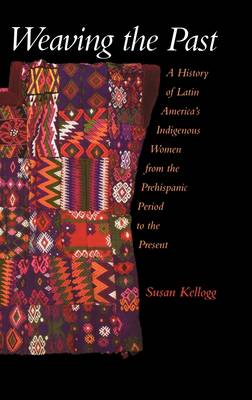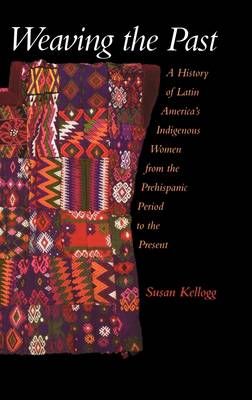
- Afhalen na 1 uur in een winkel met voorraad
- Gratis thuislevering in België vanaf € 30
- Ruim aanbod met 7 miljoen producten
- Afhalen na 1 uur in een winkel met voorraad
- Gratis thuislevering in België vanaf € 30
- Ruim aanbod met 7 miljoen producten
Zoeken
Weaving the Past
A History of Latin America's Indigenous Women from the Prehispanic Period to the Present
Susan Kellogg
Hardcover | Engels
€ 153,45
+ 306 punten
Uitvoering
Omschrijving
Weaving the Past offers a comprehensive and interdisciplinary history of Latin America's indigenous women. While the book concentrates on native women in Mesoamerica and the Andes, it covers indigenous people in other parts of South and Central America, including lowland peoples in and beyond Brazil, and Afro-indigenous peoples, such as the Garifuna, of Central America. Drawing on primary and secondary sources, it argues that change, not continuity, has been the norm for indigenous peoples whose resilience in the face of complex and long-term patterns of cultural change is due in no small part to the roles, actions, and agency of women. The book provides broad coverage of gender roles in native Latin America over many centuries, drawing upon a range of evidence from archaeology, anthropology, religion, and politics. Primary and secondary sources include chronicles, codices, newspaper articles, and monographic work on specific regions. Arguing that Latin America's indigenous women were the critical force behind the more important events and processes of Latin America's history, Kellogg interweaves the region's history of family, sexual, and labor history with the origins of women's power in prehispanic, colonial, and modern South and Central America. Shying away from interpretations that treat women as house bound and passive, the book instead emphasizes women's long history of performing labor, being politically active, and contributing to, even supporting, family and community well-being.
Specificaties
Betrokkenen
- Auteur(s):
- Uitgeverij:
Inhoud
- Aantal bladzijden:
- 352
- Taal:
- Engels
Eigenschappen
- Productcode (EAN):
- 9780195123814
- Verschijningsdatum:
- 2/09/2005
- Uitvoering:
- Hardcover
- Formaat:
- Genaaid
- Afmetingen:
- 156 mm x 234 mm
- Gewicht:
- 666 g

Alleen bij Standaard Boekhandel
+ 306 punten op je klantenkaart van Standaard Boekhandel
Beoordelingen
We publiceren alleen reviews die voldoen aan de voorwaarden voor reviews. Bekijk onze voorwaarden voor reviews.











